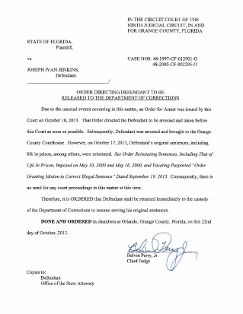|
More Escaped Florida Convicts and Forgery Methods Possible  October 23, 2013 | WMFE--Authorities are investigating whether other Florida inmates are out of prison with forged release documents. [Images courtesy of the Ninth Judicial Circuit Court of Florida, showing copies of the release orders Walker and Jenkins used to escape] The review process is underway as Joseph Jenkins and Charles Walker are back in custody in Orlando. They used forgeries to get out of prison, and officials worry other inmates might have escaped using falsified papers. Florida Department of Law Enforcement commissioner Gerald Bailey says investigators are combing through prisoner files and checking inmate canteen accounts for possible payments to accomplices. Other Fugitives Might Have Gotten Away Orlando Criminal Defense Attorney Lyle Mazin says the seven forgeries authorities have uncovered so far are probably just the beginning. He adds that Jenkins and Walker illustrate that others who got out – might have gotten away. “All their documents were in working order,” he notes. “There was no warrant out there for their arrest. They wouldn’t have been stopped at borders. There was nothing out there to alert authorities not to let these individuals leave the country. They might have very well gotten away with it.” Mazin says, if other inmates have escaped and reached countries that don’t extradite to the U.S., they might be impossible to recapture. Jenkins and Walker were awaiting transport when authorities found them at a motel in the Panhandle last weekend. Forged Motions Also Problematic Forged release papers like those two Florida inmates used to leave prison are just one way convicts can escape, Mazin says. Forged motions for release could also be a problem. Mazin says Walker and Jenkins escaped with a two-step fraud. They used a motion for release falsely attributed to the Office of the State Attorney coupled with a forged order from a judge granting that request. Mazin says an inmate could try to forge just a motion for release and then try to get a judge to authorize it. “If it’s the State’s Attorney who submits a motion that says, ‘Hey, we believe that this sentence needs to be reduced. We’ve spoken with the defense attorney, and they have no objection to this motion,’ the court might very well go ahead and order that that motion be granted,” he says. When judges think both sides agree on a motion, Mazin says, they sometimes create release orders within their chambers – and without holding hearings.
|
|
|